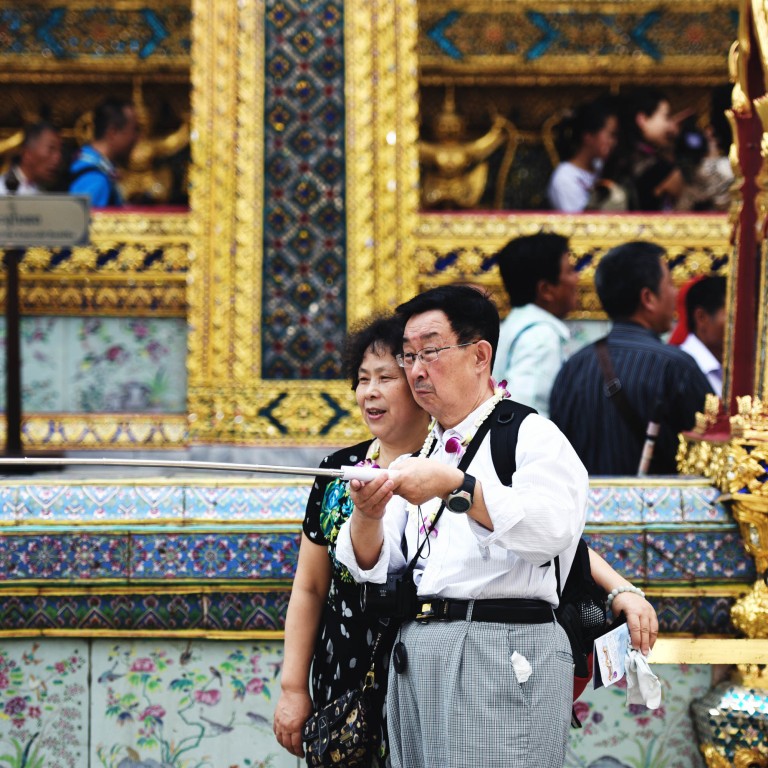
Top online travel site Qunar sees huge growth as Chinese tourists flock overseas
Rich Chinese consumers are becoming more willing to spend money traveling both domestically and abroad rather than buying luxury handbags and watches, as demonstrated by the massive growth of the country's leading online travel service provider.
Qunar capped its first year as a public company by reporting on Tuesday its third-consecutive quarter of more than 100 per cent revenue growth for the three months ended December 31.
Nasdaq-listed Qunar, which is controlled by Chinese online search giant Baidu, often known as the “Google of China”, enables users to search and compare flights, hotels, travel packages, group-buying deals and other travel-related information via its website and mobile applications.
Qunar’s strong growth comes as global luxury brands such as Louis Vuitton and Cartier are increasingly concerned about their sales outlook amid Beijing’s snowballing anti-corruption drive.
In comparison, travel business, especially for personal holidays, continues its uptrend as more rich Chinese, especially the growing middle-class, are keen to go overseas and more Chinese consumers rely on online travel booking than traditional methods.
Founded in Beijing in 2005, Qunar generates most of its revenue from advertising, as well as marketing and technology support services provided to merchants, such as travel agencies, on its platform. The company posted a 107.1 per cent increase in fourth-quarter revenue to 519.8 million yuan (HK$654.7 million), up from 251 million yuan a year earlier.
That was ahead of the company’s earlier guidance range of between 477.2 million yuan and 489.5 million yuan. It also beat the 492 million-yuan consensus estimate from a Bloomberg survey of analysts’ forecasts. Total revenue for last year rose 106.5 per cent year on year to 1.76 billion yuan.
Zhuang Chenchao, the co-founder and chief executive of Qunar, said growth last quarter was driven by strong gains in both flight ticket and hotel stay volumes on its platform, as well as healthy increase in revenue per ticket and revenue per room night.
“Mobile continued to be the key driver of our business,” Zhuang said.
“In the fourth quarter for the first time, mobile contributed about half of our total revenue and accounted for 46 per cent of total estimated flight ticket volume and 70 per cent of total estimated hotel room-night volume.”
Fourth-quarter mobile revenue jumped 400.7 per cent year on year to 257.5 million yuan, representing 49.5 per cent of Qunar’s total revenue in the period.
Alicia Yap, the head of China internet research at Barclays, said in a report on Tuesday that the “strong set of fourth-quarter numbers” showed Qunar’s “ability to improve its take rate” amid stiff competition.
Ctrip.com International, one of China's biggest online travel agencies, has also benefited from the rapid growth of the mainland’s travel industry. While Ctrip also provides packaged tour deals on Qunar’s platform, the company has boosted growth via its own smartphone application.
Yap predicted in a report last December that Qunar will not be profitable on a full-year basis until 2017. Zhuang, however, has pointed out that his company will be profitable by the end of 2016.
Based on Qunar’s fourth-quarter earnings results, the company has plenty of work ahead.
The company’s net loss during that period widened to 675.5 million yuan, compared to 121.6 million yuan the previous year, primarily due to a rise in general and administrative expenses, sales and marketing costs, product sourcing expenses, product development costs, a one-off contract termination provision and online marketing expenses for its Baidu Zhixin cooperation agreement.
Fourth-quarter sales and marketing costs jumped 273.9 per cent year on year to 278.9 million yuan, while product development expenses climbed 124.4 per cent year on year to 242.1 million yuan.

